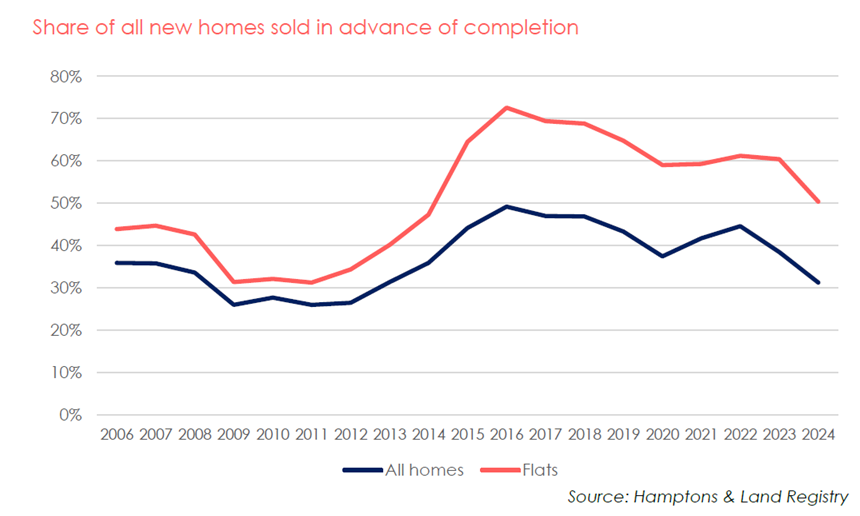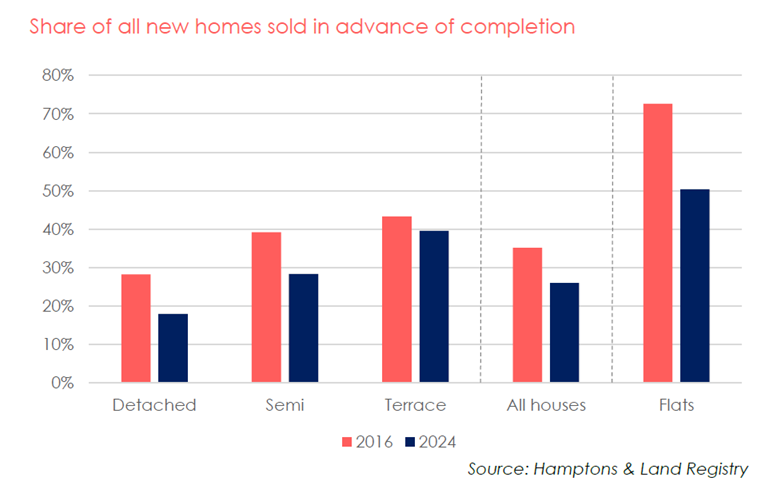London's off-plan sales fall to nine-year low; regional hotspots gain momentum

Off-plan flat sales in the North West surged ahead in 2024, outpacing London and reversing historical trends, according to new data from Hamptons.
Cities in the North West have emerged as the most active areas for off-plan purchases, where buyers commit to properties before construction is complete. The region posted the highest proportion of such sales across England and Wales, defying a broader downturn in the off-plan market.
Salford recorded the largest share, with 80% of flats sold before completion — double that of any other local authority. Liverpool followed closely with 75% of newly built flats sold off-plan last year. Other northern towns including Bradford (65%), Selby (64%), Derby (64%), Doncaster (60%), Rochdale (58%), and Gateshead (53%) also exceeded the 50% mark.
This trend contrasts sharply with data from 2016, when off-plan activity was dominated by London boroughs. Now, smaller urban areas outside the capital make up the majority of top-performing locations.
Across the North West, 63% of flats were sold off-plan in 2024 — higher than any other UK region. The area has experienced robust house price growth, prompting investors to secure units early in anticipation of continued value increases.

London, however, showed a decline in off-plan activity. The capital saw 55% of flats sold before completion, down from 59% in the previous year. This marks a significant shift: for the first time since 2007, a region outside London has recorded a higher share of off-plan sales.
The national picture reflects a broader softening. Only 31% of new-build homes, including both houses and flats, were sold off-plan in 2024 — the lowest since 2012. This is a sharp fall from the 49% peak in 2016.
London has seen one of the steepest drops, with off-plan sales down from 66% in 2016 to 37% this year. The capital’s stagnating property prices and a heavier tax burden on second homes have been major factors.
“Off-plan sales have held up in Northern England which has seen the bulk of house price growth since 2016,” said David Fell (pictured), lead analyst at Hamptons. “Investors from across the country, who are a key source of demand for off-plan sales, have continued to buy in these areas to lock in today’s prices for developments which often won’t be finished for years. The expectation that prices will be higher tomorrow remains one of the biggest drivers of off-plan sales for both investors and owner-occupiers.”
Investor sentiment appears to have cooled elsewhere. Many are now hesitant to commit to purchases years in advance, particularly where future price growth is uncertain — an about-face from 2016, when rising values encouraged early buying.
Flats remain the primary segment for off-plan transactions. In 2024, half of all completed flats had been sold before construction ended, compared to 26% of houses. Still, flat-related off-plan sales have fallen from 73% in 2016, reflecting lower investor activity and reduced confidence in developers.
Meanwhile, off-plan house sales have been more resilient, as they are often bought by owner-occupiers rather than investors. The share has slipped more modestly, from 35% in 2016 to 26% this year.

Fell noted that the trend has broader implications for the construction sector. “It is unlikely that the level of off-plan sales being agreed is sufficient for the government to get close to its 300,000 homes target, given that housebuilders rely on this forward funding to progress on site,” he said. “While bulk deals with institutional investors have helped, they haven’t replaced demand from smaller landlords.”
He added that changes to taxation have also played a role. “Last November’s rise in the stamp duty surcharge on second homes from 3% to 5% hit many off-plan investor purchases which completed last year but agreed and exchanged in 2023 or even 2022,” Fell noted. “The higher stamp duty surcharge has kept a cap on the number of investor purchases being agreed today, which will almost certainly mean fewer homes being built tomorrow.”
Want to be regularly updated with mortgage news and features? Get exclusive interviews, breaking news, and industry events in your inbox – subscribe to our FREE daily newsletter. You can also follow us on Facebook, X (formerly Twitter), and LinkedIn.



